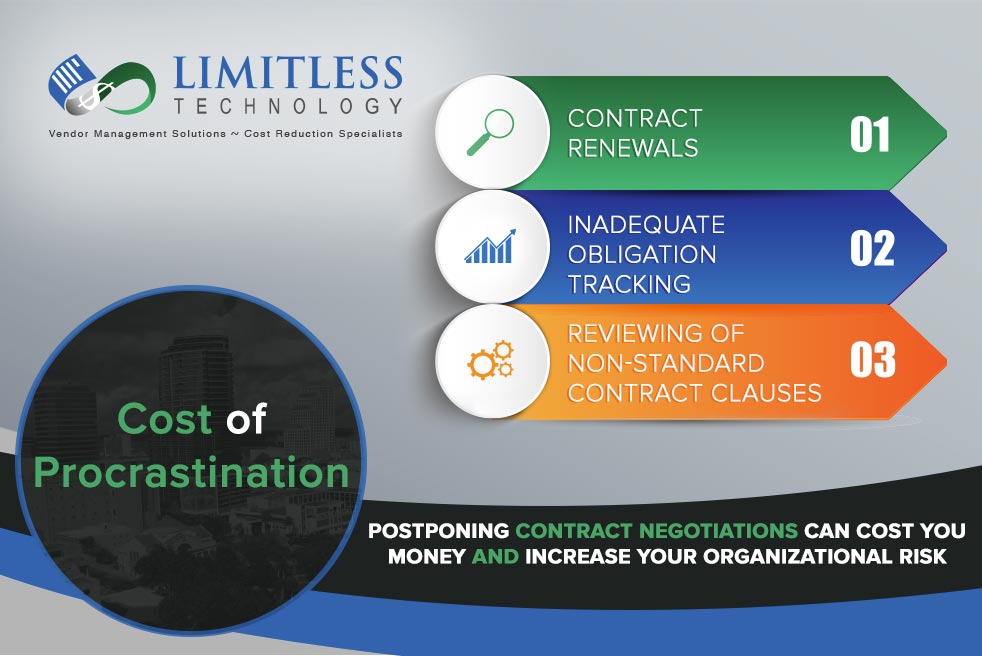Contracts are a critical piece of the puzzle when managing vendor relationships. They govern the relationships between a business and its vendors, its sub-contractors, its staff and its internal auditors.
The contract review and bill audit process, or as we call the Billing Optimization process, should be an ongoing review process, with reviews scheduled regularly. Often times “stuff happens”, and they get put off until it is more convenient.
Here are 3 ways procrastination can affect your business when it comes to contract negotiations:
1. Contract Renewals are an Opportunity to Review Terms
When an initial contract is signed, commitments and obligations are agreed and the expectation is that the contract will deliver a certain amount of value to both sides. At the point of first renewal, and each one thereafter, both sides have the benefit of real-world experience of the contract and can assess how closely that resembles what was originally agreed. This can give them a much better understanding of the real value of the contract. At renewal time, there is the opportunity to renegotiate the contract to better reflect the relative value that it’s providing to both parties. Contracts can be renegotiated to reduce costs, to drive additional benefits and concessions from vendors or to lock in commitments around innovation and compliance.
2. Inadequate Obligation Tracking
Contracts lay out the expectations and obligations for each party over a set time period. The longer that time period is, the more likely it is that these obligations will fail to be delivered as agreed. This can be due to changing circumstances and agreement from both sides to change their expectations. However, it can also be attributed to poor contract management if there aren’t processes in place to monitor obligations, carry out regular reviews and conduct performance management.
Contracts and vendors shouldn’t just be appraised at renewal time, but rather should be subject to constant review and performance management. However, many companies do not have the staff or resources to look at it that way. They use the contract review as the event that drives the review of a vendor’s performance metrics. Postponing the review means there is more opportunity for the vendor to not meet its obligations.
3. Reviewing of Non-Standard Contract Clauses
While there is nothing inherently bad with agreeing to non-standard clauses for particular contracts, the risks and implications need to be accurately assessed before they are signed off. Non-standard clauses relating to things like indemnity, termination and payment terms can have significant impacts down the line. Clearly, contract management practices have a role to play in establishing precedent and process around where exceptions are to be made and who needs to agree to them. Well-run renewal processes provide the opportunity for objective assessment of vendor contracts and time for negotiation where appropriate. Again, delaying the review process, can delay the opportunity to analyze the impact of these clauses.
The 3 areas highlighted here are only a sample of the places where unnecessary costs or risks can occur because of postponing contract reviews. There are others including soft costs like risk of non-compliance, lack of accountability from the vendor management team, and inferior services. The bottom line…don’t put off until tomorrow, what YOU SHOULD DO TODAY!
About Limitless Technology
Limitless Technology, LLC has been managing complex indirect spend and vendor documentation since 2006 for some of the largest companies in the USA saving them millions in costs.
Through our Billing Optimization and Vendor Management Solutions proprietary platforms we utilize technology, processes, expertise, time, and resources to improve our client’s bottom-line.
Limitless Technology manages your vendors, so you can manage and grow your business.
For Additional Information Contact us at:Phone: 407.330.4466




